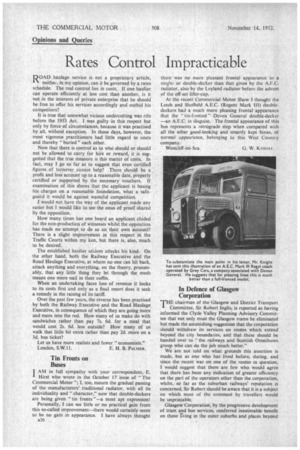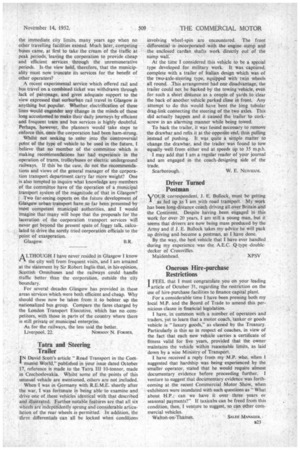Rates Control Impracticable
Page 54

Page 57

If you've noticed an error in this article please click here to report it so we can fix it.
ROAD haulage service is not a proprietary article, neither, in my opinion, can it be governed by a rates schedule. The real control lies in costs. If one haulier.
can operate efficiently at less cost than another, is it not in the interests of private enterprise that he should be free to offer his services accordingly and outbid his competitors?
It is true that somewhat vicious undercutting was rife before the 1933 Act. I was guilty in this respect but only by force of circumstances, because it was practised by all, without exception. In those days, however, the most vigorous practitioners had little regard to costs and thereby " buried " each other.
Now that there is control as to whO should or should not be allowed to carry for hire or reward, it is sug-.
gested that the true measure is this matter of costs. In fact, may I go so far as to suggest that even certified figures of turnover cannot help? There should be a profit and loss account up to a reasonable date, properly certified or supported by the necessary vouchers. If examination of this shows that the applicant is basing his charges on a reasonable foundation, what a safeguard it would be against wasteful competition.
I would not have the way of the applicant made any easier but I would like to see the onus of proof shared by the opposition.
How many times has one heard an applicant chided for the non-production of witnesses whilst the opposition has made no attempt to do so on their own account? There is a slight improvement in this respect in the Traffic Courts within my ken, but there is, also, much to be desired.
The established haulier seldom attacks his kind. On the other hand, both the Railway Executive and the Road Haulage Executive, at whom no one can hit back, attack anything and everything, on the theory, presumably, that any little thing they let through the mesh means one more nail in their coffin.
When an undertaking faces loss of revenue it looks to its costs first and only as a final resort does it seek a remedy in the raising of its tariff.
Over the past few years, the reverse has been practised by both. the Railway Executive and the Road Haulage,
Executive, in consequence of which they are going more and more into the red. How Many of us make do with sandwiches rather than pay 7s. 6d. for a meal that would cost 2s. 6d. less outside? How many of us walk that little bit extra rather than pay 2d. more on a 3d. bus ticket?
Let us have more realists and fewer `.` economists."
London, S.W.11. E. H. B. PALMER.
Tin Fronts on Buses
I AM in full sympathy with your correspondent, E A Hirst who wrote in the October 17 issue of "The Commercial Motor "; I, too, mourn the gradual passing of the manufacturers' traditional radiator, with all its individuality and "character," now that double-deckers are being given "tin fronts "—a most apt expression!
Personally, I can see little or no practical gain from this so-called improvement—there would certainly seem to be no gain in appearance. I have always thought B20 there was no more pleasant frontal appearance. to a singleor double-decker than that given by the A.F.C. radiator, also by the Leyland radiator before the advent of the off-set filler-cap.
At the recent Commercial Motor Show I thought the Leeds and Sheffield A.E.C. (Regent Mark 111) doubledeckers had a much more pleasing frontal appearance that the "tin-fronted " Devon General double-decker —an A.E.C. in disguise. The frontal appearance of this bus represents a retrograde step when compared with all the other good-looking and smartly kept buses, of normal appearance, belonging to this West Country company.
Westcliff-On-Sca. G. W. K NIGH F.
In Defence of Glasgow Corporation
THE chairman of the Glasgow and District Transport
Committee, Sir Robert Inglis, is reported as having informed the Clyde Valley Planning Advisory Committee that not only must the Glasgow trams be eliminated but made the astonishing suggestion that the corporation should withdraw its services on routes which extend beyond the city boundaries, and that these should be handed over to "the railways and Scottish Omnibuses group who can do the job much better."
We are not told on what grounds this assertion is made, but as one who has lived before, during, and since the recent war on one of the routes in question, I would suggest that there are few who would agree that there has been any indication of greater efficiency on the part of the operators other than the corporation, whilst, so far as the suburban railways' reputation is concerned, Sir Robert should be aware that it is a subject on which most of the comment by travellers would be unprintable.
Glasgow Corporation, by the progressive development of tram and bus services, conferred inestimable benefit on those riving in the outer suburbs and places beyond the immediate city limits, many years ago when no other travelling facilities existed. Much later, competing buses came, at first to take the cream of the traffic at peak Periods, leaving the corporation to provide cheap and efficient services through the unrernunerative periods. Is-the view held, therefore, that the municipality must now truncate its services for the benefit of other operators? A recent experimental service which offered rail and bus travel on a combined ticket was withdrawn through lack of patronage, and gives adequate support to the view expressed that surburban rail travel in Glasgow is anything but popular. Whether electrification of these lines would engender any change in the minds of those long accustomed to make their daily journeys by efficient arid frequent tram and bus services is highly doubtful. Perhaps, however, the planners would take steps to enforce this, once the corporation had been ham-strung.
Whilst not seeking to enter into the controversial pdint of the type of vehicle to be used in the future, I believe that no member of the committee which is making recommendations has had experience in the operation of trams, trolleybuses or electric underground railways. If this be the case, do not the recommendations and views of the general manager of the corporation transport department carry far more weight? One ,is also tempted to inquire what knowledge any members of the committee have of the operation of a municipal trans-port system of the magnitude of that in Glasgow?
Two far-seeing reports on the future development of Glasgow urban transport have so far been presented by most competent municipal authorities, and I would imagine that many will hope that the proposals for the laceration of the corporatioh transport services will never get beyond the present spate of foggy talk, calculated to drive the sorely fried corporation officials to the point of exasperation. Glasgow. B.R.
ALTHOUGH I have never resided in Glasgow I know
the city well from frequent visits, and T am amazed at the statement by Sir Robert Inglis that, in his opinion, Scottish Omnibuses and the railways could handle traffic better than the corporation, outside the city boundary. For several decades Glasgow has provided in these areas services which were both efficient and cheap. Why should these now be 'taken from it to bolster up the nationalized bus group. Compare the fares charged by the London Transport Executive, which has no competitors, with those in parts of the country where there is still private or municipal enterprise. As for the railways, the less said the better.
Liverpool, 22. NORMAN N. FORBES.
Tatra and -Steering Trailer
IN David Scott's article " Road Transport in the Coin. ' munist World," published in your issue dated October 17, reference is made to the Tatra III 10.tonner, made in Czechoslovakia. Whilst some of the points of this unusual vehicle are mentioned, others are not included. When I was in Germany with R.E.M.E. shortly after the war, I was fortimate in 'being able to examine and drive one Of these vehicles identical with that described and illustrated. Further notable features are that all six wheels are independently sprung and considerable articulation of the rear wheels is permitted. In addition, the three differentials can all be locked when conditions involving wheel-spin are encountered. The front differential is incorporated with the engine sump and the enclosed cardan shafts work directly out of the sump wall. At the time I considered this vehicle to be a special type developed for military work. It was captured, complete with a trailer of Italian design which was of the two-axle-steering type, equipped with twin wheels all round. This arrangement had one disadvantage, the trailer could not be backed by the towing vehicle, even for such a short distance as a couple of yards to clear the back of another vehicle parked close in front. Any attempt to do this would have bent the long tubular drag-link connecting the steering of the two axles. This did actually happen and it caused the trailer to corkscrew in an alarming manner while being towed. To back the trailer, it was found necessary to remove the drawbar and refix it at the opposite end, thus pulling instead of pushing. It was quite a simple matter to change the drawbar, and the trailer was found to tow equally well from either end at speeds up to 35 m.p.h.
I may add that I am a regular reader of your journal and am engaged in the coach-designing side of the trade Scarborough. W. E. NEWHAM.
Driver Turned Postman
YOUR correspondent, 3. L. Bullock, must be getting as fed up as I am with road transport. My work has been long-distance coach driving all over Britain and the Continent. Despite having been engaged in this work for over 20 years, I am still a young man, but it seems that drivers are now being mass produced by the Army and if J. F. Bullock takes my advice he will pack up driving and become a postman, as I have done.
By the way, the best vehicle that I have ever handled during my experience was the A.E.C. Q-type doubledecker of Crossvilles.
Maidenhead. • XPSV
Onerous Hire-purchase Restrictions
' FEEL that I must congratulate you On your leading
article of October 31, regarding the restriction on the use of hire-purchase facilities to finance capital plant.
For a considerable time I have been pressing both my local MP. and the Board of Trade to amend this pernicious clause in financial legislation. I have, in common with a number of operators and traders, yet to learn that a motor coach, tanker or goods vehicle is "luxury goods," as classed by the Treasury. Particularly is this so in respect of coaches, in view of the fact that each new vehicle carries a certificate of fitness valid for five years, provided that the owner maintains the vehicle within reasonable limits, as laid down by a wise Ministry of Transport. I have received a reply from my • M.P. who, when I suggested that hardship was being experienced by the smaller operator, stated that he would require almost documentary evidence before proceeding further. I venture to suggest that documentary evidence was forthcoming at the recent Commercial Motor Show, when exhibitors were inundated with such questions as "What about H.P.; can we have it over three years or seasonal payments?" If taxicabs can be freed from this condition, then, I venture to suggest, so can other commercial vehicles.
Walton-on-Thames.
SALES MANAGER. =




























































































